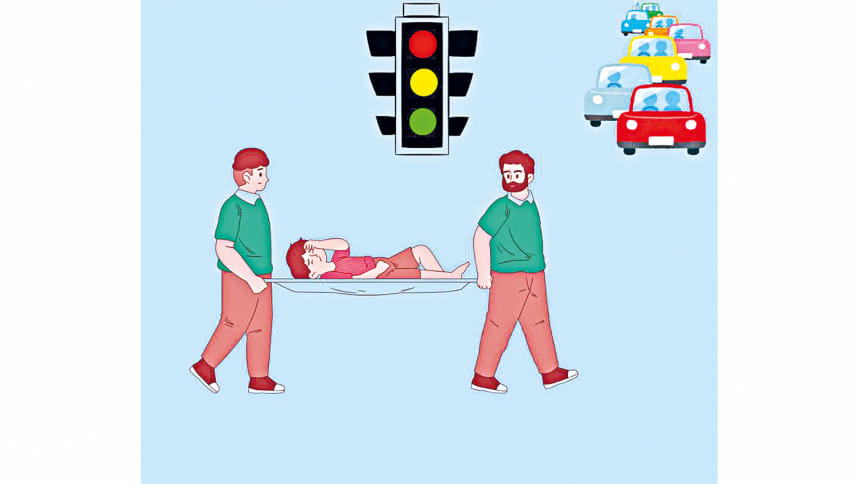Bangladesh needs to introduce a good samaritan law

The common scenario concerning road accidents is that there are usually three types of people other than victims and wrongdoers, namely, reluctant spectators, stealers, and voluntary rescuers. The reluctant spectators are liable for breaching the obligation 'to perform public duties [of rescuing victims] and to protect public property [which ought to include lives of people]' as enshrined in article 21(1) of the Constitution of Bangladesh. The stealers are clearly offenders of theft and thus liable under section 379 of the Penal Code 1860. The voluntary rescuers, who act as saviours for victims, perform their constitutional obligation under Article 21(1). They are known as 'samaritans' or 'charitable or helpful people.'
Since the samaritans perform public duties voluntarily, the statutory law should protect them from unwanted harassment by medical officials and police, and further unreasonable incrimination. They facilitate the emergency medical treatment which victims need the most within one hour— the golden hour. The global trend, developing gradually in this regard, is to enact a specific 'Good Samaritan law' that provides legal protection to the samaritans by immunising them from legal liability that might arise from injury or death consequential in the rescue process. For example, Canada enacted the Good Samaritan Act in 2001, Ireland enacted the Civil Law (Miscellaneous Provisions) Act in 2011, and the UK enacted the Social Action, Responsibility and Heroism Act in 2015. Such an immunity clause is 'generally' found in Bangladesh in section 92 which exempts from liability 'act done in good faith for benefit of a person without consent'. However, the scope of this section is limited to criminal liability only.
The Bangladesh Constitution imposes a duty upon the State to ensure the right to life and medical care in Articles 32 and 15(a), respectively. Thus, the parliament, being an organ of the State, is obliged to protect these rights and the voluntary saviours of these rights –good samaritans– by legislateon.
The trend of enacting specific laws for the protection of samaritans is followed by India as it inserted section 134A de novo by an amendment in 2019 in the Motor Vehicle Act 1988. This section immunises 'good samaritan' from any sort of legal action that may likely arise due to 'any injury to or death of the victim of an accident involving a motor vehicle' on condition that such good samaritan 'render[s] emergency medical or non-medical care or assistance.' Such immunity even extends to negligent acts or failure to perform certain acts in the rescue process. This legislative change was introduced in compliance with the Indian Supreme Court's direction to the government, in Savelife Foundation v Union of India (2016) , to formulate a legal framework for the protection of good samaritans.
The development in Bangladesh in this regard is the Emergency Medical Services for Road Accident Victims and Protection of Good Samaritans Guidelines 2018, prepared by the Department of Health Services, Ministry of Health and Family Welfare. The guidelines were subsequently approved in 2020 by the High Court Division in Syed Saifuddin Kamal v Bangladesh (2020). The Court held the guidelines as legally enforceable 'up until necessary legislative enactments are brought forth.' The term 'legislative enactment' is an indication to primary legislation and an implied direction towards legislature to enact laws in this regard.
The guidelines contain 16 rules including a preamble. One of the objectives of the guidelines is to provide protection to good samaritan of road accidents victims. As per rule 5.8, a good samaritan refers to an individual who willingly steps forward to assist injured persons, without expecting monetary payment or reward. The concept of 'Golden Hour' is recognised in rule 6.2. Furthermore, rule 13 provides immunity to good samaritan from detention or harassment by hospital authority, and also prohibits requiring Good Samaritan to disclose his/her identity or to give evidence or to pay compensation for any bonafide loss during rescue-process. Now, it is high time we converted the guidelines into statutory law as a manifestation of compliance with HCD direction.
To conclude, the Bangladesh Constitution imposes a duty upon the State to ensure the right to life and medical care in Articles 32 and 15(a), respectively. Thus, the parliament, being an organ of the State, is obliged to protect these rights and the voluntary saviours of these rights –good samaritans– by legislateon.
The writer teaches law at the Dhaka International University (DIU).

 For all latest news, follow The Daily Star's Google News channel.
For all latest news, follow The Daily Star's Google News channel. 



Comments